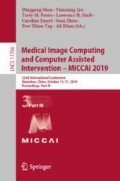Abstract
q-Space deep learning (q-DL) enables accurate estimation of tissue microstructure from diffusion magnetic resonance imaging (dMRI) scans with signals undersampled in the q-space. However, in many scenarios, such as clinical settings, the quality of tissue microstructure estimation is limited not only by q-space undersampling but also by low spatial resolution. Therefore, in this work, we extend q-DL to super-resolved tissue microstructure estimation, which is referred to as super-resolved q-DL. In super-resolved q-DL, low resolution (LR) image patches of diffusion signals are mapped directly to high resolution (HR) tissue microstructure patches with a deep network. Specifically, inspired by the successful integration of sparse representation into q-DL, we have designed an end-to-end deep network that comprises two functional components. The first component computes a sparse representation of diffusion signals at each voxel via \(1^{3}\) convolutions, where the network structure is constructed by unfolding an iterative optimization process. In the second component, convolutional layers with different kernel sizes are used to compute HR tissue microstructure patches from the LR patches of sparse representation. The weights in the two components are learned jointly. Experiments were performed on brain dMRI data with a reduced number of diffusion gradients and a low spatial resolution, where the proposed approach outperforms competing methods.
Access this chapter
Tax calculation will be finalised at checkout
Purchases are for personal use only
References
Alexander, D.C., et al.: Image quality transfer and applications in diffusion MRI. NeuroImage 152, 283–298 (2017)
Blumensath, T., Davies, M.E.: Iterative thresholding for sparse approximations. J. Fourier Anal. Appl. 14(5–6), 629–654 (2008)
Daducci, A., et al.: Accelerated Microstructure Imaging via Convex Optimization (AMICO) from diffusion MRI data. NeuroImage 105, 32–44 (2015)
Golkov, V., et al.: q-Space deep learning: twelve-fold shorter and model-free diffusion MRI scans. IEEE Trans. Med. Imaging 35(5), 1344–1351 (2016)
Johansen-Berg, H., Behrens, T.E.J.: Diffusion MRI: From Quantitative Measurement to In Vivo Neuroanatomy. Academic Press, Waltham (2013)
Kingma, D., Ba, J.: Adam: a method for stochastic optimization. arXiv preprint: arXiv:1412.6980 (2014)
Konda, K., Memisevic, R., Krueger, D.: Zero-bias autoencoders and the benefits of co-adapting features. arXiv preprint: arXiv:1402.3337 (2014)
Pasternak, O., Kelly, S., Sydnor, V.J., Shenton, M.E.: Advances in microstructural diffusion neuroimaging for psychiatric disorders. NeuroImage 182, 259–282 (2018)
Tanno, R., et al.: Bayesian image quality transfer with CNNs: exploring uncertainty in dMRI super-resolution. In: Descoteaux, M., Maier-Hein, L., Franz, A., Jannin, P., Collins, D.L., Duchesne, S. (eds.) MICCAI 2017, Part I. LNCS, vol. 10433, pp. 611–619. Springer, Cham (2017). https://doi.org/10.1007/978-3-319-66182-7_70
Van Essen, D.C., Smith, S.M., Barch, D.M., Behrens, T.E.J., Yacoub, E., Ugurbil, K.: The WU-Minn human connectome project: an overview. NeuroImage 80, 62–79 (2013)
Xin, B., Wang, Y., Gao, W., Wipf, D.: Maximal sparsity with deep networks? In: Advances in Neural Information Processing Systems, pp. 4340–4348 (2016)
Ye, C.: Estimation of tissue microstructure using a deep network inspired by a sparse reconstruction framework. In: Niethammer, M., et al. (eds.) IPMI 2017. LNCS, vol. 10265, pp. 466–477. Springer, Cham (2017). https://doi.org/10.1007/978-3-319-59050-9_37
Zhang, H., Schneider, T., Wheeler-Kingshott, C.A., Alexander, D.C.: NODDI: practical in vivo neurite orientation dispersion and density imaging of the human brain. NeuroImage 61(4), 1000–1016 (2012)
Acknowledgements
This work is supported by the National Natural Science Foundation of China (61601461), Beijing Natural Science Foundation (7192108), and Beijing Institute of Technology Research Fund Program for Young Scholars. Data were provided by the Human Connectome Project, WU-Minn Consortium and the McDonnell Center for Systems Neuroscience at Washington University.
Author information
Authors and Affiliations
Corresponding author
Editor information
Editors and Affiliations
Rights and permissions
Copyright information
© 2019 Springer Nature Switzerland AG
About this paper
Cite this paper
Ye, C., Qin, Y., Liu, C., Li, Y., Zeng, X., Liu, Z. (2019). Super-Resolved q-Space Deep Learning. In: Shen, D., et al. Medical Image Computing and Computer Assisted Intervention – MICCAI 2019. MICCAI 2019. Lecture Notes in Computer Science(), vol 11766. Springer, Cham. https://doi.org/10.1007/978-3-030-32248-9_65
Download citation
DOI: https://doi.org/10.1007/978-3-030-32248-9_65
Published:
Publisher Name: Springer, Cham
Print ISBN: 978-3-030-32247-2
Online ISBN: 978-3-030-32248-9
eBook Packages: Computer ScienceComputer Science (R0)


